Prevent my cat from tearing its hair
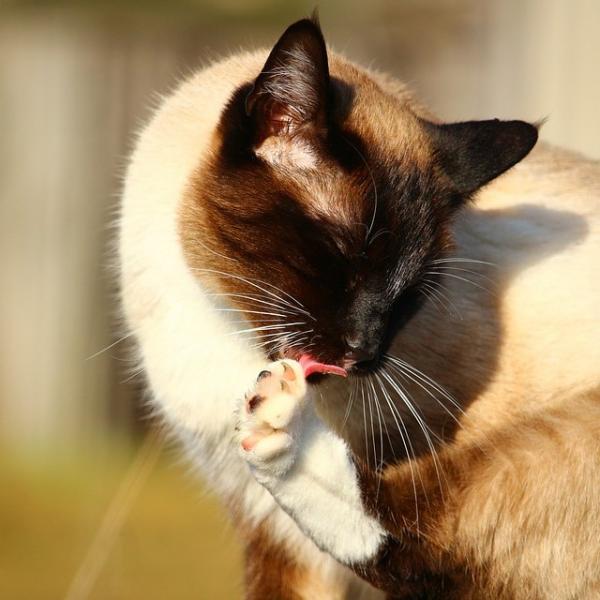
Cats are affectionate animals that are the ideal company of many people, thanks to their habits of grooming and their independence, which sometimes allows them to believe that they have the ability to “take care of themselves” with very little attention.
However, if there is something that every person who has a cat at home must understand from the beginning, it is that they are animals of customs, so at the first sign of changes in their behavior is necessary to be attentive to what is triggering that behavior.
This is why in we bring you this article to prevent my cat from tearing its hair, with advice to detect the possible causes of this in the feline and know what steps to take to reverse this situation.
Meet your cat
Anyone who has had the opportunity to spend some time near a cat, the first thing he will have noticed is how careful they are with their personal hygieneAs well as sleeping, they spend a great part of their lives preening.
The cat is not only a clean animal by nature, but also veterinarians agree that their personal hygiene is so important that, when the cat becomes seriously ill or reaches old age, the inability to perform your bath routine as before and the feeling of dirt are able to make him fall into depression.
However, it is important distinguish between cleaning habits and behavior that denotes some problem in your animal, as is tearing the hair.
When the cat pulls the hair you can notice it in the strong pulls that occur while bathing, which cause pelones, irritation in the area and sometimes wounds and redness in the skin.
That is why, in the face of this behavior, the most important thing is to detect what situations your reaction generates in your cat, so that you can attack the problem at the root. The reasons for a cat to pluck its hair They are divided as follows:
- Environmental factors
- Food allergy
- Parasites
- Stress
- Diseases
Environmental factors
Like people, it is possible that your cat is allergic to certain elements that are in their environment. He may be affected by an allergy if he licks and constantly plucks his hair in an area, because it stings him.
Usually cats are allergic to elements present in the environment such as pollen from flowers and trees (so the discomfort loa attacks more in summer and spring) and dust mites. An allergy caused by human products, such as aerosols, perfumes and other substances that are used close to the animal, should not be ruled out.
These environmental allergies are difficult to diagnose even through laboratory tests, so you should:
- Avoid the use of sprays, candles and derivatives near the animal.
- Aspirate weekly the house to get rid of dust and mites.
- Go to the veterinarian to prescribe necessary medications to relieve irritation and itching.
- Distract your cat with games so you do not try to tear the hair from the affected area.
- In case of infection in the skin, wash the area twice a day with saline.

Food allergy
Some cats may develop allergies to the food they are given, or be allergic to a specific food. This allergy produces skin irritation, so to alleviate the discomfort the cat licks the area and ends up tearing the hair.
There are no laboratory tests for this type of allergy, so you and your veterinarian should apply a diet to detect which food is causing the problem.
The substance in question can take about eight weeks to be completely expelled from the body of the feline. Perhaps it is enough to eliminate certain foods or change the brand of processed food, or it may be necessary to design for your cat a hypoallergenic diet. Discover more about the allergy in cats by browsing.
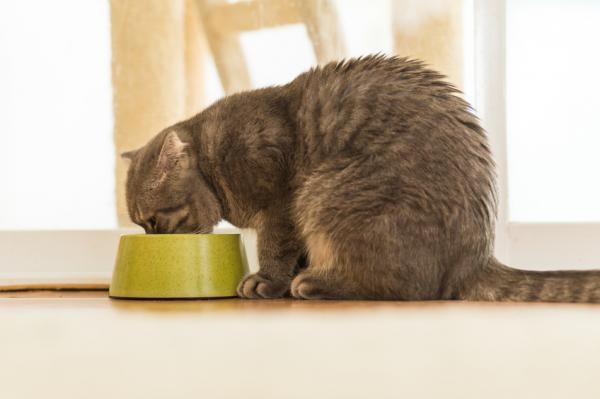
Parasites
The presence of external parasites, such as fleas and ticks, it will cause itching to the animal, making it look for scratching, licking or tearing the hair if necessary in order to alleviate the discomfort.
Why does this happen?
When the parasite sucks your cat’s blood, its saliva enters the cat’s organism as a powerful allergen, causing itching.
The presence of fleas is easy to notice not only because of the frequency with which the animal scratches or because of the rather noticeable size of the parasite (not to mention the ticks), but also because of the accumulation of black residue on the coat. of the animal They are extremely dangerous, because they can cause feline anemia.
In the presence of fleas you should:
- Go to a veterinarian to recommend the necessary product, which you must apply to all animals in the house for prevention.
- Acquire some environmental spray that kills eggs and fleas to spray it in the house, since they are lodged in furniture, cushions and carpets.
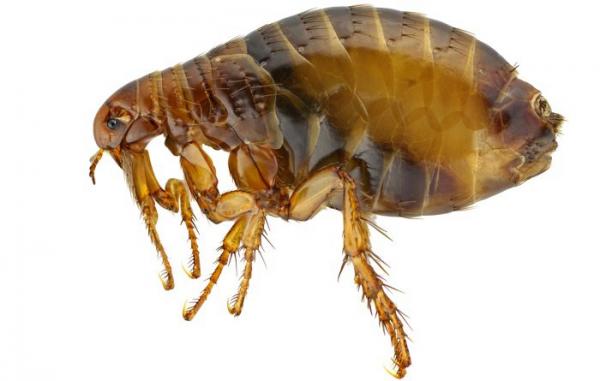
Stress
Cats are prone to stress when faced with some change in your environment, and one of the ways to prove it may be to start tearing the hair.
When the cat licks its coat, it releases endorphins, hormones that make it feel comfortable and well, so it is common that in situations that are stressful the frequency of baths increases, causing bare areas where the cat licks more assiduously. ,
What things can generate stress in the cat?
Usually, that your master or the person to whom you are more emotionally bound is on vacation, the arrival of another pet at home or a baby, some other cat hanging around, the changes, routine changes and occasions until the place changes of certain objects inside the home.
If it’s just a vacation, the cat will improve as soon as his master returns. In front of new pets or babies, it is necessary to give the cat its space in the house and fill it with pampering, so that it understands that it has not been relegated by the new member of the family.
El boredom It can also cause your cat to seek distraction by tearing his hair, so you should try to play with him and entertain him. If you usually spend a lot of time away from home during the day, leave toys and scrapers so that your kitten can entertain himself.
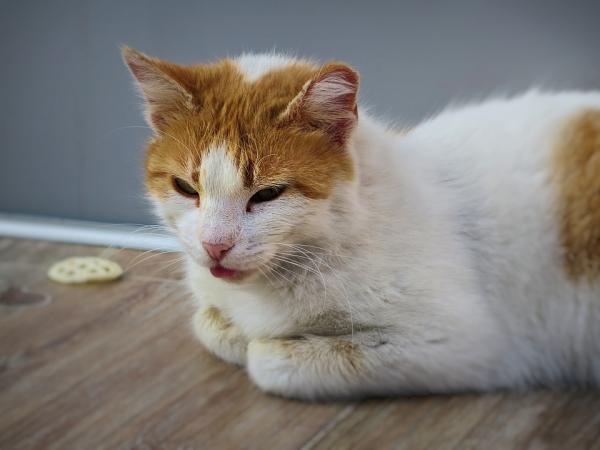
Diseases
Your cat can show that it has some ailment product of a disease through the action of plucking the hair. The tub, fungal infection, is one of these possible diseases, because it causes burning and itching in the skin.
Also, some internal ailment, such as Kidney stones or urinary tract infections, they make the cat pull its hair to try to eliminate the pain. This behavior can also be observed with problems hormonal or immune system, so it is necessary to consult a veterinarian
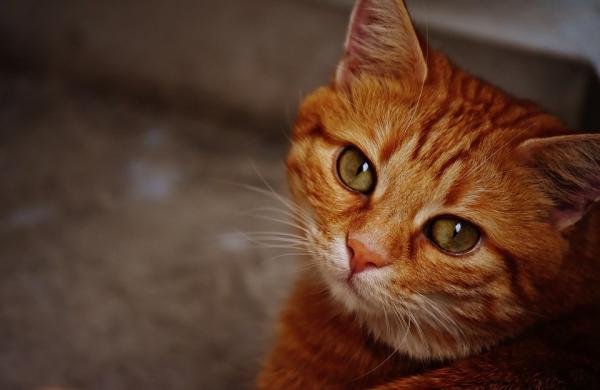
Last tips
- Never assume that your cat plucks its hair on a whim, there is always a reason behind this behavior.
- In case of any unusual behavior, go to your veterinarian to guide you in the search for possible symptoms that help determine the root of the problem.
- By bringing a new animal to the home, introduce them calmly: you can put the new pet in a kennel and put it near your cat to sniff it and familiarize it with its smell, or rub the newly arrived animal with a blanket that belongs to your cat. The adaptation process is not easy for some cats, but with patience you will achieve it. If they fight, avoid leaving them alone until you are sure they will not hurt themselves.
- Play with your cat. Never interrupt your sleep cycles, but take advantage of the hours of the day you spend awake to have fun for a few minutes. This will relieve your stress.
- Consult your veterinarian about the possibility of placing pheromone diffusers in your home, they calm the felines.
- When you notice that your cat cleans without getting hurt, offer awards and praise to associate this with a desired behavior.
- If you notice that the hair is pulled and hurt, stop it immediately and distract it.
- During the treatment prescribed by the veterinarian (if any), you may need to place the cat an Elizabethan collar to make it difficult for her to access the areas affected by her licking. Observe how you feel with this new object, because if you find it annoying you will only increase stress levels.
This article is merely informative, in .com we do not have the faculty to prescribe veterinary treatments or make any kind of diagnosis. We invite you to take your pet to the veterinarian in case of any type of condition or discomfort.
If you want to read more articles similar to Prevent my cat from tearing its hair, we recommend that you enter in our section of Other health problems.


